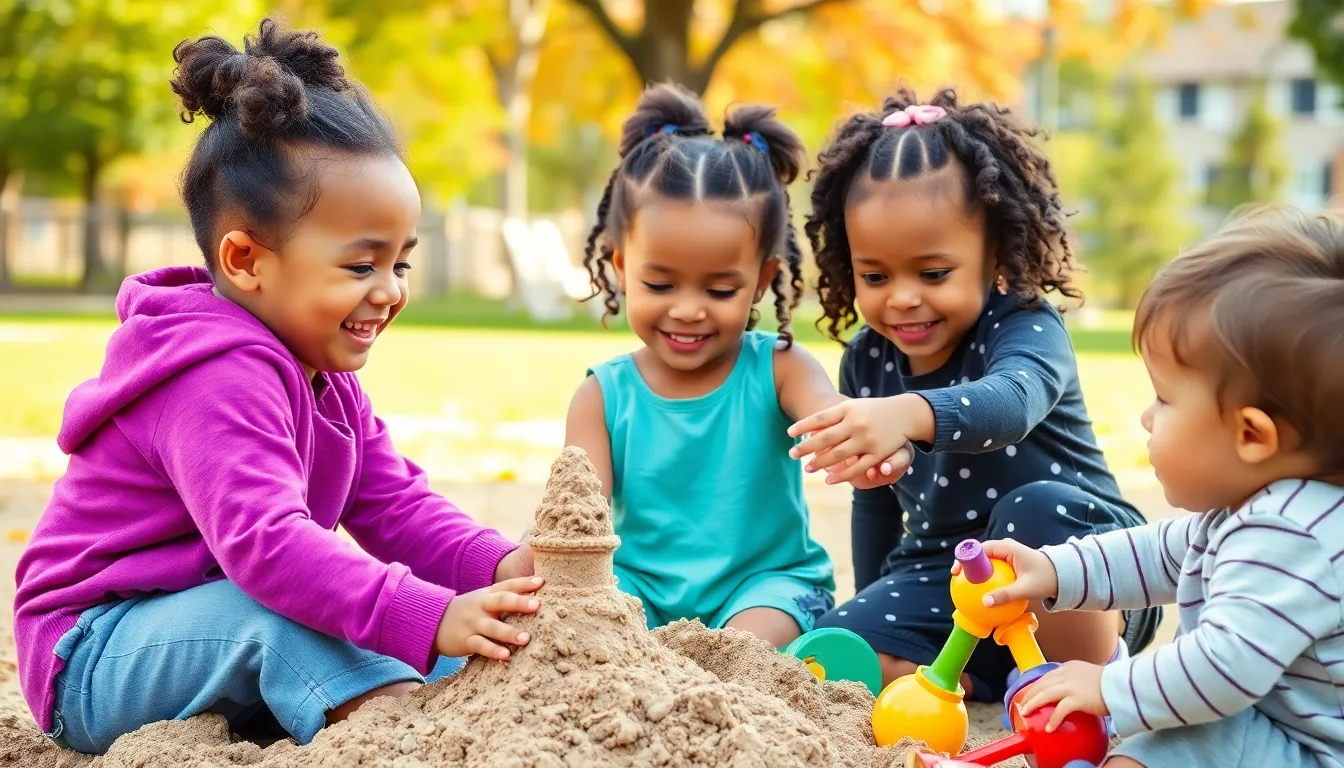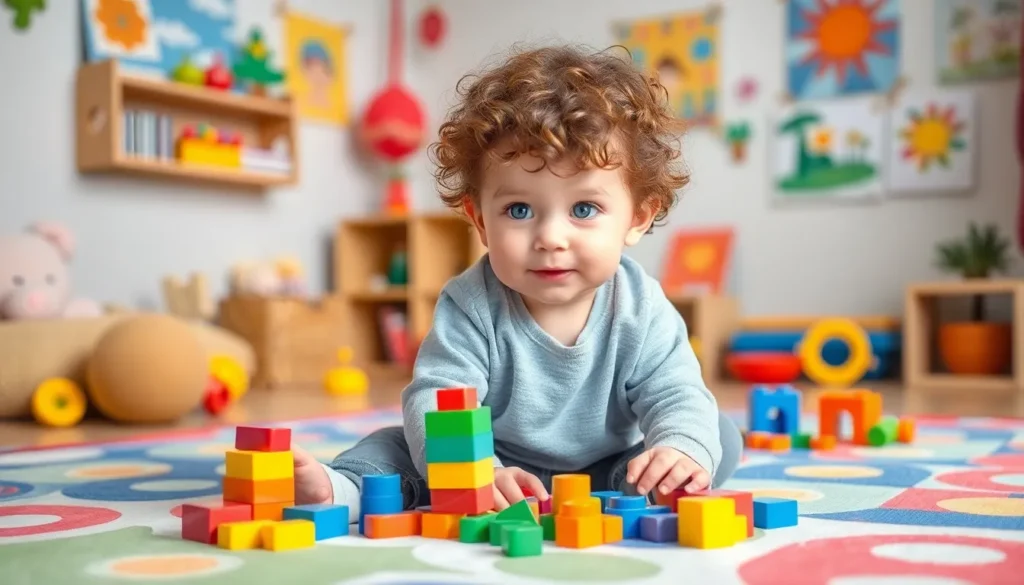Understanding toddler emotional development is like trying to solve a puzzle with a few missing pieces—challenging yet incredibly rewarding. As little ones navigate their feelings, they often swing from joy to tantrums faster than a rollercoaster ride. It’s a wild, wonderful journey that shapes their future relationships and self-esteem.
Table of Contents
ToggleUnderstanding Toddler Emotional Development
Emotional development in toddlers unfolds through key stages. Rapid changes shape their experiences and interactions.
Key Stages of Emotional Growth
At ages one to two, toddlers start expressing emotions like joy, anger, and frustration. They respond to their surroundings with simple reactions. During ages two to three, they expand emotional awareness. Toddlers recognize feelings in themselves and others, leading to more complex responses. They begin to empathize with peers, promoting social connections. By age three, self-regulation skills emerge, allowing for better management of their emotional outbursts.
Importance of Emotional Development in Toddlers
Emotional development plays a crucial role in toddlers’ overall growth. Strong emotional skills enhance their ability to interact positively with others. Experiences during this period influence future relationships and self-esteem. Understanding emotions equips toddlers to navigate challenges effectively. Developing emotional intelligence fosters resilience, enabling them to cope with life’s ups and downs. Early emotional experiences lay the foundation for future mental health and well-being.
Factors Influencing Emotional Development

Several critical factors shape toddler emotional development. Understanding these influences can enhance caregivers’ effectiveness in fostering healthy emotional growth.
Role of Parenting Styles
Authoritarian approaches may lead to increased anxiety in toddlers. In contrast, authoritative parenting encourages open communication, allowing children to express feelings freely. Responsive caregivers promote emotional literacy by validating feelings and offering guidance. Consistent discipline helps toddlers learn appropriate emotional responses. Furthermore, supportive environments nurture secure attachments, fostering confidence in emotional expression. Each parenting style contributes uniquely to a child’s emotional landscape.
Impact of Environment and Social Interactions
The environment significantly shapes emotional growth. Safe, loving spaces promote exploration and emotional security. Engaging in positive social interactions develops empathy and communication skills. Peers play a vital role in emotional development, providing opportunities for shared experiences. Group activities encourage toddlers to identify and navigate emotions within social dynamics. Varied experiences, such as playdates and structured activities, enhance emotional resilience, equipping toddlers to handle diverse emotional challenges.
Common Emotional Behaviors in Toddlers
Toddlers display a range of emotional behaviors that reflect their developing emotional landscape. Understanding these behaviors can aid caregivers in supporting emotional growth.
Expressions of Emotions
Expressions of emotions manifest vividly in toddlers. Joy often surfaces through laughter and excitement, while anger may result in screaming or physical outbursts. Frustration frequently appears when tasks prove challenging, such as building a tower or sharing toys. As toddlers progress, they begin to show empathy, responding to the emotions of peers. They’ll comfort a crying friend or exhibit concern for a sad sibling. Recognizing these emotional expressions enhances caregivers’ ability to validate feelings and foster healthy emotional connections.
Managing Emotional Outbursts
Managing emotional outbursts requires patience and understanding. Toddlers encounter overwhelming feelings that can lead to tantrums when they become frustrated or tired. They often lack the vocabulary to articulate their emotions. Offering comfort during these moments can help them feel secure. Taking deep breaths together serves as a valuable strategy to diffuse intensity. Redirecting attention to a favorite toy or activity can also minimize explosive reactions. Establishing consistent routines provides stability, reducing the frequency of outbursts over time. Caregivers play a crucial role in guiding toddlers through these emotional challenges.
Supporting Healthy Emotional Development
Supporting healthy emotional development is essential for toddlers. Caregivers can play a pivotal role in this journey.
Strategies for Parents and Caregivers
Parents and caregivers can use several strategies to nurture emotional growth. Establishing routines creates a sense of stability. Using consistent responses to emotional expressions helps toddlers feel understood. Encouraging open dialogue about emotions fosters a safe environment for sharing feelings. Practicing active listening allows toddlers to know their feelings matter. Modeling appropriate emotional responses teaches them how to express themselves effectively. Engaging in play activities promotes emotional exploration and cognitive skills. Each approach equips toddlers with the tools to navigate their emotions and strengthen connections.
Encouraging Emotional Expression
Encouraging emotional expression is key to toddlers’ development. Providing age-appropriate language for emotions helps toddlers articulate their feelings clearly. Offering praise when they share feelings reinforces positive behavior. Using stories and role-play can illustrate emotional situations, enhancing empathy and understanding. Creating opportunities for group play allows toddlers to observe and practice emotional interactions. Allowing space to express feelings prevents bottling emotions, reducing the likelihood of outbursts. Observing and validating their experiences fosters a sense of security and trust. Each effort supports emotional literacy and promotes healthy social skills.
Toddler emotional development is a vital part of early childhood that lays the groundwork for future relationships and self-esteem. By understanding the nuances of emotional growth and the impact of caregiving, parents and caregivers can foster an environment that nurtures emotional literacy.
Implementing strategies that promote open communication and emotional expression equips toddlers with the skills they need to navigate their feelings. As they learn to manage their emotions, they build resilience and empathy, essential traits for their social interactions.
Supporting toddlers through this intricate journey not only enhances their emotional well-being but also strengthens the bond between caregivers and children, ensuring a healthier emotional future.



